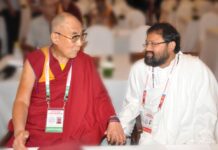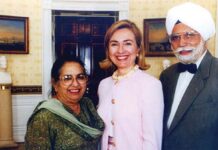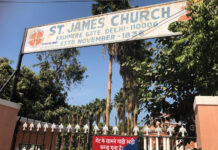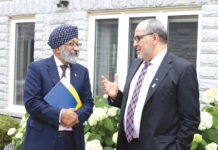By Gurmukh Singh
TORONTO: Who doesn’t know Nav Bhatia? He is one of the well-known Sikh faces in Canada.
Bhatia is many things rolled into one.
He is the top Hyundai dealer in Canada. And he is the only designated Toronto Raptors Superfan.
‘‘I have not missed even a single Raptors game in Toronto for the past 22 years,’’ gushes Nav Bhatia who has taken basketball to South Asians kids here in a big way.
‘‘Each year, I purchase thousands of tickets for Raptors games and donate many of these to various community organizations, including mandirs, gurdwaras, synagogues, churches and to the kids from low-income areas,’’ says Bhatia.
But there is another side to this busy man which the world doesn’t know. He is deeply into philanthropy. ‘‘God has given me everything, and I want to do everything possible to help underprivileged kids, particularly orphans and girls in India. I want to give them a chance in life,’’ says Bhatia who himself adopted a one-year-old orphan girl from India in 1991.
Thanks to Bhatia and his wife Arvinder, that one-year-old girl today has grown into an accomplished young woman called Tia Bhatia and become a passionate advocate for adoption.
‘‘I want people in India to know that our girls are just as important as our boys and we should do everything we can to provide them equal opportunities and safe environment so that they can realise their dreams,’’ says Bhatia who in November 2016 became the Global Ambassador for World Vision Canada for its Daughters of India Initiative.
The Daughters of India Initiative aims at making schools in Punjab a safer place by providing washrooms so that girls are encouraged to enroll and stay in schools.
‘‘My commitment is to raise $200,000 for the World Vision initiative by November 2018 and we have already raised about $70,000,’’ says Bhatia who started his immigrant journey in Canada in 1984.
‘‘For the first four months, I used to change bus after bus to knock at various doors and attend interviews, but nobody gave me a job. They had all sorts of reservations about me,’’ recalls Bhatia.
Nav Bhatia at a Raptors game.In this interview, Bhatia retraces his eventful life journey and how he ended up in Canada and became an inspiring success story.
Q: Does your family originally belong to Delhi?
Yes, we are a Delhi family. My father used to run an optical business from early 1950s in the Mehrauli area of Delhi.
I was born in Delhi and did my schooling there. Then I went to DAV College Jalandhar to do my pre-medical because my father wanted me to become a doctor. But it didn’t happen.
Q: So why didn’t you become a doctor?
Instead I went to the US in 1971 to do my mechanical engineering degree from California State University. I got my mechanical engineering degree in 1974 and then started businesses with one of my brothers who was there. We owned a theatre and then we opened a couple of restaurants – called India Oven and India Sweet House in Pico and Fairfax. But in 1982, I moved back to India.

Q: Why did you move back to India?
I moved back to Delhi to join my family’s optical business in Mehrauli. I also got married to Arvinder in 1983 and was in the mode to expand our business. But things were looking bad because of the Punjab problem. Even in 1982 and 1983 before the 1984 anti-Sikh riots took place, things were getting very bad. So, I decided to move out of India.
Q: Why did you choose Canada?
I just decided that my wife and I should not live here and move to Canada. We got our immigration in just six months. We moved to Canada just about the time the tragic 1984 events were unfolding in India.
We landed in Malton in August 1984 and rented a basement for $350. There were a few people here whom we knew from Delhi.
Q: How were your early days in Canada?
For four months, I went from one interview to another, but nobody hired me. People had their objections. Some wanted me to remove my beard and turban. But I wasn’t going to do that because I had given two commitments to my mother when I was 16 years of age. One was that I will never cut my hair and the other was that I will never drink. I have kept my word to my mother.

Q: So what was your first job?
After four months of knocking around, I got a job as a car salesman with Rexdale Hyundai. All the salesmen at that dealership were white and I was the only non-white among them. They would make fun of me. They used to call me all sorts of names.
Q: Like?
Yeah, they used to call me towel-head, etc, etc. Frankly, I developed a thick skin and cared little about what they said.
I knew that I had to perform better than them and I did. In the first three months, I sold 127 cars. It was a record at that time, and it still stands.
And within three months, I got promoted as a business manager and my role was to help their business grow and help other salespeople. I did very well there for three years.
Then in 1987, Hyundai headquarters asked me to go to their Mississauga Hyundai dealership as its general manager.
Q: So you went to Mississauga Hyundai as its general manager.
Yes, when I joined Mississauga Hyundai, it was on the verge of bankruptcy. Moreover, the day I joined there, all salespeople barring one left.
They were all white guys and they didn’t like to work under me. The only man who didn’t leave was Steve Wilson. And he is with me to this day.

Q: How did you save Mississauga Hyundai from bankruptcy?
My team and I turned it around by hard work and dedication. We hired good people and worked closely with the factory. Our hard work paid off soon.
Q: What happened next?
We kept on growing and in 1991 I became a partner in the dealership.
Q: You are famous for your involvement with the Toronto Raptors. When did it start?
It happened in 1995 when the Raptors came here and I bought two tickets for the season. I used to love basketball.
That’s how my association with the Raptors started. Today, I get 10 tickets – six are court-side seats and four platinum seats. These are prime seats.
Q: Then you started taking hundreds of South Asian – particularly Sikh – kids to Raptors games each year. Why?
In 1999, an incident happened to me which jolted me to do something to fight stereotypes about Sikhs and turbans.

Q: What was that incident?
I went to a Bell Mobility centre to get my cellphone repaired. There was a guy sitting there. He was waiting for a cab. So when I entered there, he thought that I am the cabbie (because most Sikhs are cabbies). Not that there is anything wrong with being a cabbie because I believe in the dignity of labour and am very proud of my Sikh brothers and sisters driving taxis. But I also wanted Sikhs to be known as doctors, lawyers, and businessmen.
That day I decided that I have to do something to highlight who we are and help my community overcome the stereotypes.
Q: So what did you do after that incident?
I brought 3,000 South Asian kids to Vaisakhi Day game at Air Canada Centre. Now, Air Canada Centre can hold 20,000 people, so 3,000 South Asian kids was a pretty big number. People started noticing who we are.
We have done it 25 times so far. It is an annual feature. We spend about $300,000 on tickets for kids each year. Now you can see even more than 4,000 south Asians in the crowd at Air Canada Centre.
Remember, basketball has become very popular since then and tickets are very difficult to get now.
Q: When did the Raptors give you the title of Superfan?
In 1998, the Raptors general manager gave me this title because I used to be the most visible and vociferous supporter of Raptors at their games.
In 2013, they gave me another title of Raptors Ambassador for South Asians. Many of Raptors stars are my personal friends. Vince Carter was my first best friend among them. Over the years, I have come to know many of them, including Drake, very well.
For the record, I have not missed even a single Raptors game in Toronto over the past 22 years. It is a record in NBA.
Q: That’s why they call you a Raptors addict, right?
Yes, I am an addict for Raptors. And my slogan is: I don’t drink, I don’t smoke, I don’t womanize – I only Raptorize!
This is now a registered slogan!

Q: Didn’t your involvement with the Raptors impact your business?
It impacted my business in a positive way as I became a sort of brand and Raptors fans would come to buy cars from my dealership. Through basketball, I have successfully fought stereotyping and helped people integrate better.
Basketball has become my life passion. Last year, I distributed 5,000 basketballs to the needy children here.
I am also building four basketball courts in Malton where I first landed. The city of Mississauga will share half of the cost. I want our kids not to fall into drugs and gangs. I want them to become basketball stars.
I plan to build more basketball courts in the future.
Q: How many dealerships do you own today?
I have two Hyundai dealerships. Mississauga Hyundai and Rexdale Hyundai. Interestingly, Rexdale Hyundai gave me my first job in Canada in 1984 and six years ago I bought it.
Today, over 150 people work with us and we have sold over 43,000 cars at Mississauga Hyundai and over 6,000 at Rexdale Hyundai.
Q: How did World Vision Canada make you the ambassador for their Daughters of India Initiative?
World Vision Canada came to me seven months ago to help them with their initiative to build washrooms for girls in 20 schools in Faridkot district of Punjab.
They came to me because of my association with the Raptors and also because I am a Punjabi.
World Vision plans to build 60 washrooms in 20 schools because the lack of washrooms in India prevents over 63 million girls from enrolling in schools.
So in November 2016, they made me their ambassador for their India initiative on girls.
Q: How are you helping World Vision in this initiative?
I have given them the commitment to raise $200,000 by November 2018. We have already raised $70,000.
I am told that the first washrooms will be ready by June this year.
But more than anything else, I want to help the poor girls of India. I have seen their plight. There are horrific stories everywhere.
Q: You also adopted a year-old orphan girl from India years ago. She is your only daughter.
Yes, I am working for the poor and orphan girls of India because I myself adopted one orphan girl from India in 1991.
Tia was just one year old when we brought her over here. Because she got all the opportunities in life, our daughter has grown into a successful young woman.
She has given us so much happiness in life that I cannot narrate it. Our life has become very fulfilling because of Tia.
Because of her own life story, my daughter is very passionate about adoption. She has created her life story – titled Tia Bhatia Adoption Story – and put it on YouTube.
In it, Tia passionately narrates why adoption is such a beautiful thing.
Our family is a living proof of how adoption can be such a beautiful thing.
Q: Amid such hectic life, what is the first thing you do when you get out of the bed?
I get up at 6.30 am and first bow before the holy Guru Granth Sahib.
I give my thanks to God.
Q: What one thing do you do before retiring for the day?
Again, I bow my head in prayers before the holy Guru Granth.
Q: Your hero who has influenced you the most.
My mother. She was a woman of discipline and hard work.

Q: Are you a vegetarian or non-vegetarian?
I am a vegetarian.
Q: Your favourite drink.
I don’t drink alcohol.
Q: Are you political?
No.
Q: Your favourite film.
Mother India.
Q: Your favourite dish.
Rice with curry.
Q: How do you combat anger?
By reciting naam (holy scripture).
Q: Who are your role models?
Nelson Mandela because of his long struggle against injustice and discrimination against the black people and Barack Obama for what he has done despite not having the requisite support from Congress.

Q: One thing that you don’t like about yourself.
I am very stubborn and I don’t change easily.
Q: Your motto.
Work hard with passion.
Q: Your most precious possession.
My daughter.
Q: What is your state of mind often?
I am very happy and contented.
Q: What is one thing that you don’t like in others?
When people discriminate against others on the basis of colour, race or gender.
Q: Do you think you have been lucky?
I am blessed.
Q: The city you like the most.
Mississauga. I love my city.

Q: Your recipe to relax.
Follow basketball.
Q: One moment in life which impacted you the most.
When the white guy at Bell Mobility thought that I was a cabbie. It was there and then that I decided to do something to combat stereotyping of the Sikhs.
Q: If there is one thing that you would like to change, what is that?
There should be no discrimination on the basis of colour, race, gender and religion. That’s why I wanted to see a black president in the US. When Obama was elected, I was so happy.
Q: What would you like to be remembered for?
For reaching out to the underprivileged and helping the needy and poor kids.
READ NEXT: Bob Dhillon: The Sikh who became Canada’s real estate mogul








